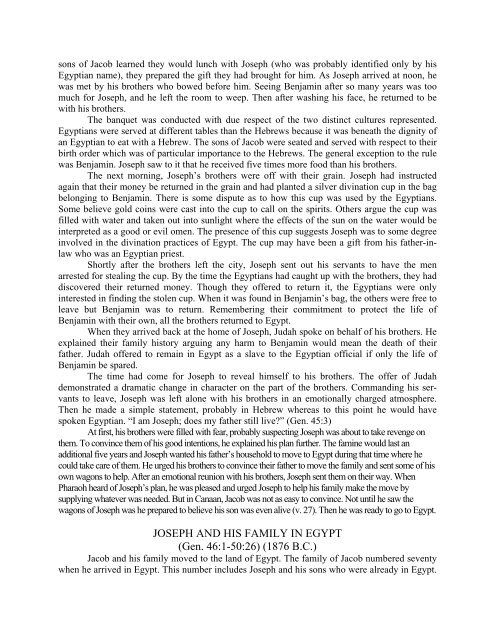A Journey Through The Old Testament - Elmer Towns
A Journey Through The Old Testament - Elmer Towns
A Journey Through The Old Testament - Elmer Towns
Create successful ePaper yourself
Turn your PDF publications into a flip-book with our unique Google optimized e-Paper software.
sons of Jacob learned they would lunch with Joseph (who was probably identified only by his<br />
Egyptian name), they prepared the gift they had brought for him. As Joseph arrived at noon, he<br />
was met by his brothers who bowed before him. Seeing Benjamin after so many years was too<br />
much for Joseph, and he left the room to weep. <strong>The</strong>n after washing his face, he returned to be<br />
with his brothers.<br />
<strong>The</strong> banquet was conducted with due respect of the two distinct cultures represented.<br />
Egyptians were served at different tables than the Hebrews because it was beneath the dignity of<br />
an Egyptian to eat with a Hebrew. <strong>The</strong> sons of Jacob were seated and served with respect to their<br />
birth order which was of particular importance to the Hebrews. <strong>The</strong> general exception to the rule<br />
was Benjamin. Joseph saw to it that he received five times more food than his brothers.<br />
<strong>The</strong> next morning, Joseph’s brothers were off with their grain. Joseph had instructed<br />
again that their money be returned in the grain and had planted a silver divination cup in the bag<br />
belonging to Benjamin. <strong>The</strong>re is some dispute as to how this cup was used by the Egyptians.<br />
Some believe gold coins were cast into the cup to call on the spirits. Others argue the cup was<br />
filled with water and taken out into sunlight where the effects of the sun on the water would be<br />
interpreted as a good or evil omen. <strong>The</strong> presence of this cup suggests Joseph was to some degree<br />
involved in the divination practices of Egypt. <strong>The</strong> cup may have been a gift from his father-inlaw<br />
who was an Egyptian priest.<br />
Shortly after the brothers left the city, Joseph sent out his servants to have the men<br />
arrested for stealing the cup. By the time the Egyptians had caught up with the brothers, they had<br />
discovered their returned money. Though they offered to return it, the Egyptians were only<br />
interested in finding the stolen cup. When it was found in Benjamin’s bag, the others were free to<br />
leave but Benjamin was to return. Remembering their commitment to protect the life of<br />
Benjamin with their own, all the brothers returned to Egypt.<br />
When they arrived back at the home of Joseph, Judah spoke on behalf of his brothers. He<br />
explained their family history arguing any harm to Benjamin would mean the death of their<br />
father. Judah offered to remain in Egypt as a slave to the Egyptian official if only the life of<br />
Benjamin be spared.<br />
<strong>The</strong> time had come for Joseph to reveal himself to his brothers. <strong>The</strong> offer of Judah<br />
demonstrated a dramatic change in character on the part of the brothers. Commanding his servants<br />
to leave, Joseph was left alone with his brothers in an emotionally charged atmosphere.<br />
<strong>The</strong>n he made a simple statement, probably in Hebrew whereas to this point he would have<br />
spoken Egyptian. “I am Joseph; does my father still live?” (Gen. 45:3)<br />
At first, his brothers were filled with fear, probably suspecting Joseph was about to take revenge on<br />
them. To convince them of his good intentions, he explained his plan further. <strong>The</strong> famine would last an<br />
additional five years and Joseph wanted his father’s household to move to Egypt during that time where he<br />
could take care of them. He urged his brothers to convince their father to move the family and sent some of his<br />
own wagons to help. After an emotional reunion with his brothers, Joseph sent them on their way. When<br />
Pharaoh heard of Joseph’s plan, he was pleased and urged Joseph to help his family make the move by<br />
supplying whatever was needed. But in Canaan, Jacob was not as easy to convince. Not until he saw the<br />
wagons of Joseph was he prepared to believe his son was even alive (v. 27). <strong>The</strong>n he was ready to go to Egypt.<br />
JOSEPH AND HIS FAMILY IN EGYPT<br />
(Gen. 46:1-50:26) (1876 B.C.)<br />
Jacob and his family moved to the land of Egypt. <strong>The</strong> family of Jacob numbered seventy<br />
when he arrived in Egypt. This number includes Joseph and his sons who were already in Egypt.
















